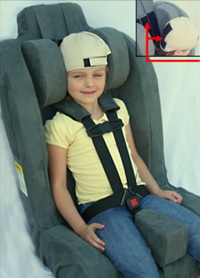When it comes to protecting your precious passengers nothing is more needed then the right car seat to fit your growing child. It is even more of a consideration when your child has special needs that need to be met for safe transport and care. Every state has its own rules and regulations for child safety that need to be addressed. It is also paramount that your baby and growing toddler also meet federal regulations for the age of the car seat and how it is placed in your car.

We reviewed the best six car seats for special needs children below:
Our Top Pick: Spirit APS Car Seat – Standard.
This car seat offers the traditional safety options and comes with added support and particular needs of the special needs children. It is designed to grow with the child from a weight range of 25 lbs to 130 lbs which max out around 5’6” in height.
Pros:
- Swing away hip and truck support pads make it easy for parent or caregivers to move the child and adjust when necessary.
- Made of water-resistant materials and is designed to make stains/damage easy to remove especially with bladder/bowel discharge.
- A Buckle Guard is added to prevent the child or young adult from removing the harness.
- A bolt-in hardware kit comes with the car seat to secure it to the vehicle and to make adjustments as needed.
- 3” extender thrust wedge comes out of the seat so the child can be reclined when necessary.
Cons:
- The seat is difficult to adjust once they are installed.
- The Buckle guard can stick when trying to unlatch the child.
Our Second Pick: Carrot 3 Child Restraint.
The Carrot 3 child restraint system is highly rated for children with autism spectrum disorder for children with severe behavioral issues. The way the car seat is designed, it holds even the most extreme mover and keeps them safe and secure in their seat.
Pros:
- High-density foam inserts to position the child correctly.
- Is designed for children 30 to 108 lbs (37” to 60”)
- It comes with a “Free Angle” Recline feature that allows 180° for easy diaper changes and conforms to the car seat for child comfort during those times.
- It comes with LATCH, a secure anchoring system, which is equipped with Low anchors and tethers for the seat to be strapped to the built-in car seats.
Cons:
- Difficult to move between vehicles.
Our Third Pick: Columbia 2000 Therapedic Integrated Positioning Car Seat.
This is a lightweight seat that is designed to be narrower and accommodate a child with mild positioning needs. It has a retainer clip guard to prevent chest piece disengagement during collisions or violent movements. This car seat has been crash-tested for safety by the Federal Moving Vehicle Safety Standards board and comes highly rated by a parent for children who do not have severe body control problems.
Pros:
- Crash tested to FMVSS #213 standards which sets standards for child safety.
- Certified for use in an aircraft for the traveling parent.
- Multi-positioning options are available.
- It comes with a 5 point harness to keep the child safe.
- It has a soft-padded headwinds.
- It comes with Dual hook tether straps to prevent the car seat from moving.
- It has memory foam padding to reduce sores and fatigue on the child.
Cons:
- It does not adapt well with a growing child even with 2” and 5” extenders.
- It does not work for children over 100 lbs.
Our 4th Pick: Pilot Special Needs Booster Seat.
The Pilot is a pediatric special needs high-backed booster seat designed to grow with the child. It has a built-in positioning vest to support their torso and leg guards for positioning as well as lateral trunk pads to make it a snug fit.
Pros:
- It fits a child up to 120 lbs.
- It has two positions for the child to ride in.
- It comes with adjustable height pads.
Cons:
- It is hard for a child to move around normally.
Our 5th Pick: Spirit Plus Adjustable Positioning System Car Seat.
The Spirit Plus adjustable car seat is a special needs system that has a swing-away trunk and hip supports that are usually only found on complex wheelchairs. This system not only secures the child to the seat but also allows for easy adjustments and easy removal of the child from the seat.
Pros:
- Is a unit for children 25 to 130 lbs (66 inches in height).
- It can recline to 30° from the standard upright position.
- Comes with a machine-washable padded cover for easy care.
- It has a 5 point harness to keep your child secure.
- Latex and silicone-free.
Cons:
- It does not recline fully for easy diaper changes.
Our Final Pick: Tumble Forms 2 Carrie Seat System w/Tray & Footrests (available in sizes preschool through small adult).
The Tumble Forms 2 Carrier Seat System is a multi-functional car seat. It is designed to support your child while providing a footrest, a neck stabilizer, and a tray for eating. It is more than a car seat as it can be used in your own home as well.
Pros:
- It comes with a fold-out table for eating and activities.
- The entire seat can tilt back 45° for easy childcare.
- The tray has a quick-release mechanism for easy removal and cleaning.
- The neck supports are adjustable.
Cons:
- While this seat can be used in a car and in a house, it functions better as a house feature.
- It does not provide enough support.
- This unit does not grow well with the child.
The National Highway Traffic Safety Administration recommends that every car seat be chosen for the size of the child that is to be riding in it and that it is installed correctly. There are four types of car seats your child will progress through:
Basics of Car Seat Safety:
- Rear-facing: Birth until around 12 months of age
-
- Infant-only seats can only be used as rear-facing seats.
- Convertible seats usually have higher height and weight limits in rear-facing mode.
-
- Forward-facing
-
- 1-3 years
-
It’s best to keep your child in this type of car seat for as long as you can.
Once your child exceeds the weight and height restrictions then it is time to get the next size up in car seats.
-
-
- 4-7 years
-
This larger car seat is designed to be buckled into the seat like a normal car seat. Keep them in this seat until they exceed the height and weight restrictions for it.
- Booster seat
-
- 8-12 years
-
Until your child exceeds the height and weight restrictions for the booster. The seatbelt should be able to fit snugly across their chest and not restrict the airway of the child. It should keep them as safe as possible.
- Seat belt seats
-
- 12+ years
- Once your child has reached this age they should be big enough and fit the adult-sized car seats securely, though follow the height and weight regulations on the booster and your child’s own growth because that will determine their readiness for the adult seats.
- 12+ years
-
In Conclusion:
The rear-facing car seats are the safest for all children until they meet weight and height restrictions, especially for children with special needs. For children with certain physical disabilities and poor motor control, the need for additional straps and braces is greater, which means a more custom car seat.
Car seats for special needs children are not as prevalent and tend to be more expensive. Choosing the right car seat is difficult for most new parents, but when you have to have it customized to fit the special needs of your child as they grow, it becomes even more complex and difficult.
A lot of the cheaper car seats are adjustable, but they do not provide the extra straps and support for a child who has difficulty controlling their movements. Car seats should be selected based on how the child’s disability will progress over time. For additional information see https://www.nhtsa.gov/equipment/car-seats-and-booster-seats for regulations on car seats for special needs children. Be sure to look at the rules and regulations for your own state as well because each state has its own regulations to follow.
Keren Simanova is a busy mommy by day and a passionate writer by night. While spending countless hours researching car seats for her children, she created an educational car seat blog, CarSeatsMom.com to educate other mothers about the importance of car seats. Further, along the way, the blog became an invaluable source for research of a variety of car seat brands, unique features, and mommies’ reviews.

Leave a Reply